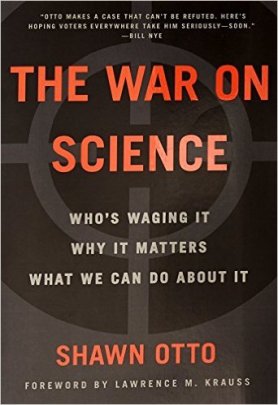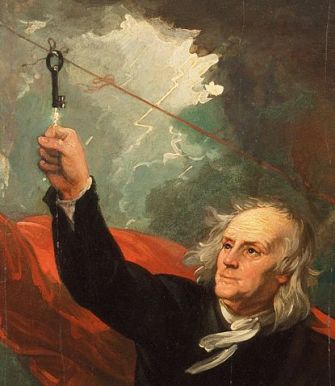This Saturday, many scientists and supporters of science will attend the March for Science in Washington D.C. or at marches in their local area. To understand why scientists across the globe are taking to the streets, let’s play a guessing game. I’ll describe a political issue centered around the widespread use of a controversial scientific topic and you guess what I’m discussing:
You likely encounter this scientific research area every single day of your life. One of our major political parties refuses to listen to scientists about the potential impacts of this phenomenon. And many members of the public hold incorrect beliefs about this research area despite years of work by scientists to show the facts point to the contrary.
If you think I’m describing the Republican party’s refusal to accept that the burning of fossil fuels by humans is contributing to global climate disruption, you are correct.1,2,3 If you think I’m describing the anti-GMO sentiment held by many Democrats, you are also correct (genetically modified organisms are engineered crops widely used in agriculture).3,4 Almost all scientists agree that carbon dioxide (much of it released by human activity) is a major contributor to climate change; similarly, almost all scientists agree that GMO crops are not only safe to eat but can help fight starvation in many regions of the globe.
Why then do many elected officials and voting Americans ignore the advice of the scientific community? I recently read a book that looks to answer this complex question.

Shawn Otto’s 2016 book, The War on Science: Who’s Waging It, Why It Matters and What We Can Do About It, does a great job describing how the anti-science movement across the political spectrum in our country – and much of the western world – has gained its strong influence. Just as importantly, it provides strategies to fight back against this problem.
A large portion of The War on Science is a history of science in politics, highlighting the important role science played in the founding of our country and continues to play to this day. Many founders of the United States of America, including Thomas Jefferson and Benjamin Franklin, were advocates for science. They believed the use of the scientific method to understand our world was crucial to the success of a democracy. Whether you have no background in science or have been studying science your entire life, you will find this history engaging and thought-provoking.

Before shifting the focus of the book to what you and I can do about the war against science, Otto comments, “We’ve now had the briefest of tours of the vast intellectual, ideological, and economic war on science.” This is my biggest critique of the book: it is difficult to do justice to the 300-year of history of science in American politics in under 350 pages. The story Otto tells is compelling, but at times oversimplifies issues to fit a black and white picture.
That being said, The War on Science as a whole is insightful, discussing how scientists have lost the faith of many Americans despite the huge benefits science and technology have provided to the world. Otto outlines two overarching motivations for people turning their back on science. First, a particular scientific theory may run contrary to political and religious beliefs or may be opposed to economic interests (remember, a “theory” in science is usually something that is not hypothetical, but well accepted, like gravity). Examples of this can be seen in the fight against teaching evolution in schools and tobacco corporations’ denying the link between smoking and lung cancer.
Numerous scientific issues have become highly politicized, and, as Otto describes, scientists have largely remained quiet for the past several decades. They avoid these debates about science policy out of fear that others would paint them as partisan or that they would lose credibility. However, when an epidemiologist demonstrates a link between cigarette smoke and lung cancer, her work has unavoidable political implications. Otto argues that scientists have a responsibility to not hide from politics and to bring their knowledge to the public. The March for Science this weekend may be a first step for many scientists in engaging with a broader audience.
The second cause Otto posits for people losing trust in science is that it’s a response to negative consequences of scientific innovation, whether those consequences were accidental or the result of misconduct. The mobilization of science during the Second World War brought about huge benefits for society – diseases were cured and wars were won. But there was a dark side to the new power of science: nuclear weapons were created that could level entire cities, and widely-used pesticides that helped eliminate insect-borne illnesses had unintended consequences for animals such as bald eagles5 and bees.6 (For more on the story of the pesticide DDT, see this blog post.) Scientists developed technologies that showed great promise and companies implemented them on huge scales without understanding (or willfully ignoring) the potential impacts of these technologies. Understandably, many Americans became frustrated with science.

This is where I think The War on Science ties in with the work at the Center for Sustainable Nanotechnology (CSN). Scientists in the CSN are excited by the potential for nanotechnology to greatly improve our world, but we also understand some of the mistakes made by past generations of scientists. We are interested in studying new nanomaterials to understand their potential effects on environmentally-relevant organisms. When we identify a negative impact of a nanomaterial on an organism, we try to understand the chemistry behind why it occurs, and work on redesigning that material to maintain its function while minimizing its environmental impact. Hopefully, by both doing great science and doing our best to think ahead about possible consequences, we can play a part in rebuilding public trust in science.
If you are at all curious about political action contrary to advice from scientists, I encourage you to check out The War on Science by Shawn Otto.
Note: For more discussion about the book, check out our podcast episode, “Seven Stages of Technological Adaptation.”
MORE RELATED READING
- USA Today: People trust science. So why don’t they believe it? by Alia E. Dastagir
- Compound Interest infographic: The March for Science – Ten things that chemistry has done for us
- Science magazine: Meet the 30-somethings behind the March for Science by Lindzi Wessel
- BuzzFeed: Bill Nye And The Science March’s White-Dude Drama by Azeen Ghorayshi
- The Contemplative Mammoth blog: Science for everyone: my #RallyforScience remarks by Jacqueline Gill
- The Atlantic: What Exactly Are People Marching for When They March for Science? by Ed Yong
- Undark: At the Science March, Negotiating Divisions Over the Role of Diversity by Saul Elbein
REFERENCES
- Gills, J. “Republicans Try a New Tack on Climate Change,” The New York Times, Feb 2, 2017. Retrieved from https://www.nytimes.com/2017/02/02/science/climate-change-republicans.html
- Bump, P. “EPA chief’s climate change denial is easily refuted by the EPA’s website,” The Washington Post, March 9, 2107. Retrieved from https://www.washingtonpost.com/news/politics/wp/2017/03/09/epa-chiefs-climate-change-denial-is-easily-refuted-by-the-epas-website/
- Science News Staff. “See where Clinton and Trump stand on science,” Science News, Sept 13, 2016. Retrieved from https://www.sciencenews.org/article/see-where-clinton-and-trump-stand-science
- Kollipara, P. “Opposition stalls U.S. Senate bill aimed at blocking GMO food labels,” Science, March 17, 2016. Retrieved from http://www.sciencemag.org/news/2016/03/opposition-stalls-gmo-food-labeling-bill-us-senate
- U.S. Fish & Wildlife Service. “Fact Sheet: Natural History, Ecology, and History of Recovery,” June 2007, retrieved from https://www.fws.gov/midwest/eagle/recovery/biologue.html
- U.S. Environmental Protection Agency. “Factors Affecting Pollinator Health,” 2016. Retrieved from https://www.epa.gov/pollinator-protection/pollinator-health-concerns#factors
